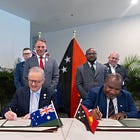Corporate Tax Dodging Hits Record Low as ATO Enforcement Nets $100 Billion Haul
This piece is freely available to read. Become a paid subscriber today and help keep Mencari News financially afloat so that we can continue to pay our writers for their insight and expertise.
Today’s Article is brought to you by Empower your podcasting vision with a suite of creative solutions at your fingertips.

Large corporations paying no tax in Australia dropped to a record low of 28% in the latest financial year, marking the first time the figure has fallen below 30% since transparency reporting began over a decade ago, Assistant Treasurer Dr Daniel Mulino MP said Thursday.
The Australian Taxation Office’s annual corporate transparency report showed the tax office collected more than $100 billion from large companies for the second consecutive year while voluntary compliance rates climbed to approximately 96%, Dr Mulino told ABC News Afternoon Briefing.
“The overall tax take from large corporations is over $100 billion for the second year in a row,” Dr Mulino said. “In addition, what the report says is that the rate at which corporates voluntarily paying their full tax has gone up to something in the order of 96% but also that the proportion of large corporates paying no tax has dropped below 30% to 28% for the first time ever.”
The decline from 36% of companies paying no tax a decade ago to 28% today represents what Dr Mulino characterized as a significant improvement in compliance, though notable companies including Optus parent company Singtel and streaming giant Netflix remained among those paying no Australian tax.
Truth matters. Quality journalism costs.
Your subscription to Mencari directly funds the investigative reporting our democracy needs. For less than a coffee per week, you enable our journalists to uncover stories that powerful interests would rather keep hidden. There is no corporate influence involved. No compromises. Just honest journalism when we need it most.
Not ready to be paid subscribe, but appreciate the newsletter ? Grab us a beer or snag the exclusive ad spot at the top of next week's newsletter.
Dr Mulino attributed the improvement largely to $3 billion in ATO enforcement investments over the past three years, which the government estimates will generate $15 billion in additional revenue.
“We’ve invested something in the order of $3 billion over the last three years in the ATO’s capabilities in this area in terms of their enforcement capabilities, their evaluation and forensic capabilities when it comes to large corporations and wealthy individuals,” Dr Mulino said. “And it’s estimated that’s going to pay off in terms of $15 billion extra in revenue. So that’s a really worthwhile investment for the Australian community and the Australian government.”
The assistant treasurer defended the tax system despite roughly one-third of large companies still paying no tax, citing legitimate reasons including annual losses, carried-forward losses from previous years, or large capital investments being written off.
“There are often reasonable reasons why a large corporation may pay no tax,” Dr Mulino said. “That could include the fact that it might make a loss in a year or it might be carrying forward losses or it might have very large investments that it’s writing off.”
When pressed on whether the system achieves appropriate balance, Dr Mulino expressed broad satisfaction while emphasizing continued enforcement improvements.
“Broadly I think the system is is working quite well and and as I said you you know you would expect that companies that are making a loss in that you wouldn’t be paying income tax that’s a pretty standard way that an income tax system would work,” Dr Mulino said. “What we’re seeing though is over the last decade there’s been quite a material shift from 36% of companies not paying any tax down to 28 so we feel that that’s really bringing it much, much closer in line with the current legal arrangements, which I think are broadly right.”
The positive compliance trends come as the United States under President Donald Trump withdrew from a global tax floor agreement designed to prevent companies from shifting operations to tax havens, raising questions about Australia’s ability to maintain revenue from multinational corporations.
Dr Mulino said international coordination through the OECD’s Base Erosion and Profit Shifting program remains critical despite U.S. divergence.
“At the OECD there was the BEPS program which was the base erosion and profit shifting and that was a really important arrangement where all of the advanced economies came together and agreed to move tax arrangements in alignment as much as they could to reduce the opportunities for large multinational corporations to profit shift,” Dr Mulino said. “So I very much support continued arrangements in that vein.”
He acknowledged the U.S. withdrawal poses risks but said the OECD framework continues.
“Any time a large economy diverges from aligned action, that does put at risk the overall arrangements,” Dr Mulino said. “But look, what I’d say is that the OECD program remains in place. We’ve got some important initiatives, which Minister Lee has put in place in the last parliament, which have been legislated. So this remains a priority for us.”
On other fiscal matters, Dr Mulino confirmed the Productivity Commission will review GST distribution arrangements as required under legislation, with several states expressing dissatisfaction with the current model that provides Western Australia with top-up payments.
“It’s never been the case that everybody’s happy with it,” Dr Mulino said of GST distribution. “It’s more often been the case that there’s a whole range of suggestions, and that’s fine.”
He declined to commit to accepting Productivity Commission recommendations regarding WA’s guaranteed minimum share.
“The Treasurer will receive that report and then the government will respond after that’s been considered,” Dr Mulino said.
The assistant treasurer also addressed stalled negotiations with states and territories over public hospital funding, with New South Wales Premier Chris Minns earlier Thursday accusing the Commonwealth of offering less than previously agreed amounts.
“The offer that we’ve gotten from the Commonwealth is lower than the agreed amount from our last National Cabinet meeting,” Minns said. “So we’re going backwards, we’re not going forwards. So the idea that we’re on the brink or the precipice of a deal is a long way off.”
States and territories issued a joint statement this week saying the Commonwealth’s $20 billion funding boost proposal falls well short of requirements.
Dr Mulino defended the government’s approach, citing election commitments on bulk billing and urgent care clinics now being implemented, but acknowledged complexity in negotiations involving multiple government levels and interrelated policy areas including NDIS foundational supports and aged care.
“These are complex negotiations,” Dr Mulino said. “Different parts of our care economy are all interrelated, firstly. And secondly, that we’re talking about a range of areas, whether it be health care or the NDIS or aged care that involve multiple levels of government, sometimes all three levels of government.”
He declined to specify whether negotiations would meet year-end deadlines or require extensions.
“I don’t want to comment on the details of the negotiations that the Minister for Health is engaged in with his counterparts and other ministers,” Dr Mulino said. “What I would say is that the Commonwealth Government has always stated that it is more than open to good faith discussions on these complex issues.”
On superannuation taxation reform targeting balances over $3 million, Dr Mulino confirmed the policy remains a government commitment but could not specify when legislation would reach Parliament.
“That remains the government’s policy,” Dr Mulino said. “And for me, it’s a really important part of our tax mix, our tax policy. It’s a very well-designed, well-targeted measure that I think is important for the sustainability and fairness of our super system.”
When questioned about delays in legislating the measure despite its stated importance, Dr Mulino cited parliamentary complexity.
“It’s just a matter of the government figuring out all the different elements of policy that we need to fit into the next few weeks,” he said.
The assistant treasurer also welcomed Papua New Guinea’s cabinet approval of the Pukpuk defense treaty, which elevates PNG to ally status alongside the United States and New Zealand.
“I think this is a really important development,” Dr Mulino said. “It elevates our relationship with PNG to the same level that we have with the US and New Zealand. It’s a really important treaty.”
He highlighted provisions allowing individuals from each country to work closely with the other’s armed forces.
“It contains the highest level of commitments to each other, but also contains really important commitments in terms of enabling individuals from each country to have opportunities to work very closely with each other’s armed forces,” Dr Mulino said. “So for me it’s a really important regional deal and it was, you know, important to see that step through each of the country’s cabinets and that’s now happened and that’s really important.”
The wide-ranging interview illustrated the government’s focus on fiscal sustainability amid multiple funding pressures and complex federal-state negotiations. The corporate tax compliance improvements provide revenue support as the government navigates hospital funding demands, NDIS cost growth, and aged care system pressures.
The ATO transparency data covers the 2023-24 financial year and provides the most comprehensive public accounting of large corporate tax payments in Australia. The report’s publication comes as the government prepares for an expected federal election, with tax fairness and healthcare funding likely to feature prominently in campaign debates.
Dr Mulino’s comments on various policy fronts suggest the government faces timing pressures to finalize multiple complex negotiations before Parliament’s final sitting weeks, with hospital funding, superannuation taxation, and federal-state financial arrangements all requiring resolution or extension decisions.
The assistant treasurer’s emphasis on ATO enforcement capabilities and international tax cooperation reflects government priorities to maintain revenue amid global economic uncertainty and shifting U.S. policy positions under the Trump administration.
Whether the improved corporate compliance trend continues will depend partly on sustained ATO enforcement funding and the effectiveness of international coordination frameworks as major economies potentially diverge on tax policy approaches.
Sustaining Mencari Requires Your Support
Independent journalism costs money. Help us continue delivering in-depth investigations and unfiltered commentary on the world's real stories. Your financial contribution enables thorough investigative work and thoughtful analysis, all supported by a dedicated community committed to accuracy and transparency.
Subscribe today to unlock our full archive of investigative reporting and fearless analysis. Subscribing to independent media outlets represents more than just information consumption—it embodies a commitment to factual reporting.
As well as knowing you’re keeping Mencari (Australia) alive, you’ll also get:
Get breaking news AS IT HAPPENS - Gain instant access to our real-time coverage and analysis when major stories break, keeping you ahead of the curve
Unlock our COMPLETE content library - Enjoy unlimited access to every newsletter, podcast episode, and exclusive archive—all seamlessly available in your favorite podcast apps.
Join the conversation that matters - Be part of our vibrant community with full commenting privileges on all content, directly supporting The Evening Post (Australia)
Catch up on some of Mencari’s recent stories:
It only takes a minute to help us investigate fearlessly and expose lies and wrongdoing to hold power accountable. Thanks!







